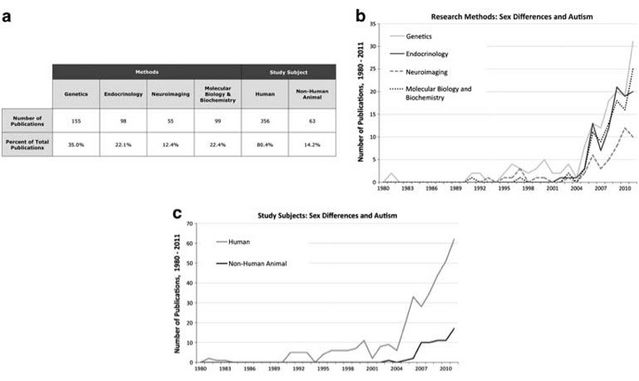Autism
Male Risk of Autism: No One Expects the Spanish Inquisition
Anathematizing autism research for gender stereotyping sets back psychiatry.
Posted August 20, 2017 Reviewed by Abigail Fagan
According to the Sacred Congregation for the Doctrine of the Faith, previously known as the Holy Roman Inquisition, there are three grades of condemnation to be applied to false views in theology:
- A belief that might lead to sin is cautioned against as unsafe.
- A belief that would lead to the commission of venial sin is condemned as erroneous.
- Anything that leads to mortal sin—the loss of the soul—is anathematized as heretical.
The belief that there is a biological basis for observed differences in cognition and psychology between the sexes has been an unsafe one for 50 years. I discovered this in the mid-1970s when I started one of the first courses to be taught on what is now known as Evolutionary Psychology at The London School of Economics.
At much the same time, my friend and colleague, Charles Crawford started a similar course at Simon Fraser University in Vancouver coincidentally with the same title as mine, Evolution & Social Behaviour. Indeed, I discovered later that both of us adopted the same measure to safeguard ourselves against inquisition through hearsay by ostentatiously tape-recording all our lectures and classes. (In both cases, it worked wonderfully.)

More recently, official psychology has deemed a belief in a biological basis for cognitive differences between the sexes erroneous. Furthermore, according to one account,
Autism has become a ‘biomedical platform’ for sex differences research in fields such as genetics, endocrinology and neuroscience. Increasingly, researchers in these fields pose the male prevalence of autism as a model for investigating sex differences in the brain, and offer basic research on sex differences in the brain as a resource for understanding the etiology of autism [see above]. The use of autism as a biomedical platform for sex differences research obscures empirical and interpretive contestations surrounding claims about the male prevalence of autism. We argue that the uncritical use of this research platform across many fields stands to distort scientific research on autism and contribute to harmful gender stereotypes.
As long as a belief in biology—because that is what it comes down to—was only regarded as erroneous, it could be argued about and scientific research into it conducted, albeit unsafely. Indeed, if something you believe is true is labelled "erroneous," it gives you an incentive to prove your case against countervailing prejudice.
But what people are already calling Gulag Google’s peremptory dismissal of a male member of its staff (would they have dismissed a woman, one wonders?) marks a watershed in the debate and sends a clear message to anyone and everyone that belief in biology in relation to group differences in behaviour is now heresy and will be punished with the most severe sanctions. With self-appointed inquisitors of a new, unholy urban inquisition already patrolling multi-national company and university campuses, I can’t help but think that this case is just the start of it and that before long we can expect some spectacular auto-da-fés.
Advocates of the extreme male/female brain theories have not helped. In my view, they are guilty of fanning the flames, at least as far as the imprinted brain theory is concerned because it emphatically does not claim that autism or psychosis are simply extensions of normal male or female cognition. Nevertheless, the source I quoted above erroneously cites me as a subscriber to the extreme male brain (EMB) theory, and goes on to make the following specific accusation:
By citing the 4:1 male prevalence of autism as a research model for human sex differences research, biomedical investigations intentionally or unintentionally bring the confirmatory weight of the elite molecular biological sciences to the EMB theory and the harmful gender stereotypes about female ability in math, science and engineering it promotes.
I have long suspected that the astonishing silence of the media and of official psychology on what The New York Times rightly called “psychiatry’s grandest working theory since Freud” was largely explained by the perceived unsafety and alleged erroneousness of the biology on which it is based. But if belief in that biology is now deemed heretical as the Google case and the quote above suggests, at least another entire generation of the mentally ill will have to suffer before psychiatry adopts the new thinking.
All I can say in my own defence is that, contrary to the EMB, the imprinted brain theory proposes that conflicts between paternal and maternal genetic self-interests over the crucial issue of parental investment have driven the evolution of imprinted and X chromosome gene expression in such a way that imbalances in the paternal direction result in autism spectrum disorders and imbalances in the maternal/X direction in psychotic spectrum disorders. Nevertheless, the simple fact that all fathers are male and all mothers female means that you could mistake this much more subtle situation for a simple sex conflict, which it emphatically is not.
Finally, let me make three points worth bearing in mind:
First, history teaches that today’s heresies are often tomorrow’s orthodoxies, and this is frequently the case in science (think Copernicus, Darwin, and Quantum Mechanics—a heresy compared to classical mechanics that even Einstein could not fully bring himself to accept, despite his major contribution to it).
Second, making martyrs is a dangerous business: they have the habit of being re-incarnated—or at least, re-interred—as saints (again, recall Darwin’s interment in Westminster Abbey against his wishes, and Copernicus’s recent re-interment).
Finally, I have already hinted in a previous post at the worrying parallels you can see between what is going on in the West today and what happened in the Soviet Union during Trofim Lysenko’s reign of terror as Stalin’s biology czar. But in the USSR the damage was mainly to agriculture and biology if you ignore the murders, imprisonments, exiles and other real affronts to human rights. In today's West, the focus on the human rights issue may obscure much more fundamental damage to the social, political, and economic infrastructure in the long run—not to mention the harm already being done to science and psychiatry.




